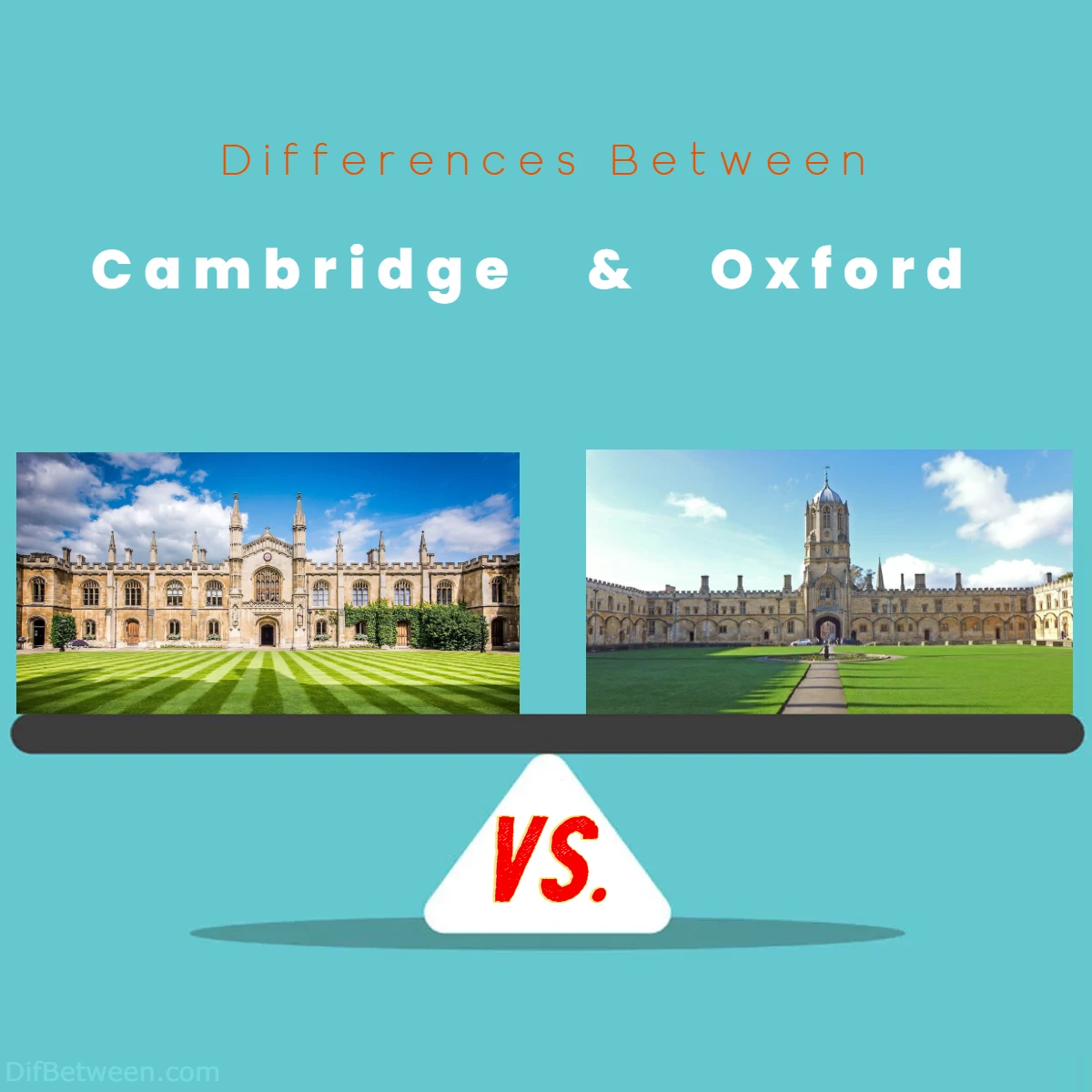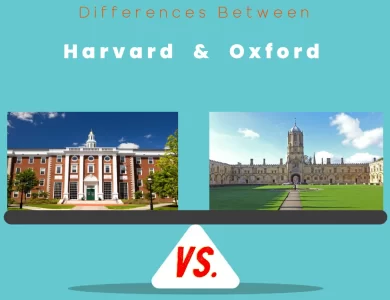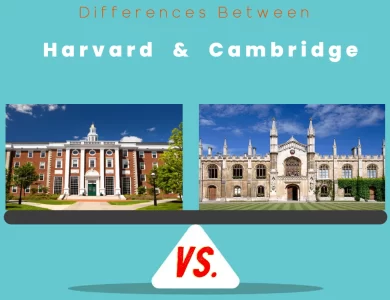
| Aspect | Cambridge | Oxford |
|---|---|---|
| Foundation Year | Founded in 1209. | Founded in 1096. |
| Colleges | 31 Colleges and 1 Permanent Private Hall. | 38 Colleges and 6 Permanent Private Halls. |
| Campus Atmosphere | Quintessential English charm, punting on River Cam. | Urban blend with historical charm, vibrant city life. |
| Academic Emphasis | Specialization and in-depth study. | Combination of specialization and exploration. |
| Curriculum Flexibility | More structured with specialized Tripos system. | Flexible curriculum with optional courses. |
| Teaching Style | Lectures, seminars, and intense one-on-one tutorials. | Intensive tutorials and small-group discussions. |
| Application Process | Subject-specific assessments and interviews. | Holistic approach including personal statements and aptitude tests. |
| Campus Architecture | Elegance with mix of Gothic and modern styles. | Grandeur with blend of medieval and neoclassical styles. |
| Notable Alumni | Stephen Hawking, Charles Darwin, Sylvia Plath. | Margaret Thatcher, J.R.R. Tolkien, Oscar Wilde. |
| Traditions | Quirky events like Goat Race and May Balls. | Literary celebrations and historic pubs. |
| Sports Rivalries | The Boat Race and May Bumps. | The Boat Race and the Varsity Match (rugby). |
| Global Impact | Scientific advancements and research collaborations. | Cross-disciplinary impact and research excellence. |
| Campus Size | Compact city with close-knit community. | Larger city with diverse opportunities. |
| Social Scene | Cultural vibrancy with theaters, music venues. | Literary celebrations, societies, and historic pubs. |
| Application Approach | Subject-specific assessments and interviews. | Holistic approach with broader evaluation. |
| Degrees Offered | Tripos system with Parts I, II, and III. | Less rigid degree structure with varying options. |
Picture yourself at this crossroads, standing at the intersection of knowledge and aspiration. Your journey is not merely about choosing a university; it’s about sculpting your future, crafting the narrative of your intellectual voyage. As we delve into the nuanced differences between Cambridge and Oxford, you’ll uncover the essence of their teaching philosophies, the cadence of their historical rhythms, and the colors of their unique cultures. From the soaring spires of Oxford to the tranquil banks of the River Cam, every brick and stone whispers stories of the minds that have flourished within their shadows. So, as we set sail on this expedition of contrasts and commonalities, remember that the choice is yours to make—a decision that will shape not just your academic trajectory but the tapestry of your life itself.
Differences Between Cambridge vs Oxford
The main differences between Cambridge and Oxford lie in their academic focus, teaching methods, campus atmosphere, and application processes. While Cambridge emphasizes specialization through its tripos system, Oxford offers a more flexible curriculum that encourages exploration. Teaching styles vary, with Cambridge employing intense one-on-one tutorials and Oxford favoring small-group discussions. The campus atmosphere differs too, with Cambridge’s quintessential charm and punting culture contrasting Oxford’s blend of urban energy and rural beauty. In terms of admissions, Cambridge often requires subject-specific assessments, while Oxford takes a holistic approach, considering personal statements and aptitude tests. Explore the intricacies of these distinctions to make an informed choice between these prestigious institutions.
1. Historical Tapestry and Legacy
Cambridge: Weaving Centuries of Academic Excellence
In the heart of picturesque Cambridge city, the University of Cambridge has been weaving its rich tapestry of academic excellence since its founding in 1209. With a lineage that spans over eight centuries, Cambridge proudly holds its reputation as one of the oldest universities in the English-speaking world. It’s a place where the past converges with the present, and where ancient architecture and modern research facilities coexist harmoniously.
The university’s esteemed Colleges, each possessing its own unique history and traditions, create a sense of academic camaraderie. Students become part of a College community, fostering close relationships with peers and mentors alike. The collegiate system nurtures a sense of belonging and encourages interdisciplinary exchanges, enriching the overall academic experience.
Oxford: A Glimpse into Academic Antiquity
Not to be outshone, the University of Oxford, founded even earlier in 1096, offers its own chapter of historical grandeur. Set against the stunning backdrop of the city of Oxford, this institution carries an aura of timelessness that few can rival. The university’s 38 constituent Colleges and six Permanent Private Halls contribute to its diverse academic landscape, creating a microcosm of scholarly pursuits.
Both universities share a rich heritage, having played crucial roles in the evolution of Western education. While Cambridge embraces its ancient yet vibrant spirit, Oxford leans towards an even more venerable past, both reflecting the captivating journey of academia through the ages.
2. Punting in Cambridge and the Dreaming Spires of Oxford
Cambridge: Punting Along the River Cam
When you think of Cambridge, images of punting along the tranquil River Cam often spring to mind. This iconic tradition involves navigating the waterways in flat-bottomed boats called punts, using a long pole to push against the riverbed. It’s not just a picturesque activity; it’s a metaphor for the leisurely pursuit of knowledge that Cambridge cherishes. Punting, with its blend of relaxation and elegance, captures the essence of the Cambridge experience.
Oxford: The Dreaming Spires and Academic Allure
Oxford, on the other hand, is famous for its “dreaming spires,” a phrase coined by poet Matthew Arnold to describe the city’s ethereal skyline punctuated by the spires and towers of its historic buildings. The allure of Oxford lies not only in its architectural splendor but also in its academic prowess. The university’s focus on rigorous tutorials and personalized mentorship shapes its reputation as a place where intellectual curiosity is nurtured and academic boundaries are pushed.
3. Academic Focus and Structure
Cambridge: Specialization and Flexibility
Cambridge’s academic structure is known for its strong emphasis on specialization. Students typically choose a specific subject for their undergraduate studies and delve deeply into it. This allows for a focused educational journey, where students can immerse themselves in their chosen field. The tripos system—a pattern of undergraduate education in separate parts—contributes to this specialized approach, culminating in the highly regarded Cambridge degree.
Oxford: Breadth and Exploration
Oxford, on the other hand, follows a more flexible curriculum structure. Students can choose a major subject but are also encouraged to explore additional areas of interest through optional courses. This breadth of study aligns with Oxford’s commitment to fostering well-rounded individuals who can approach complex issues from multiple angles. The tutorial system at Oxford, where students engage in intense one-on-one or small-group discussions with tutors, epitomizes this broad-based approach.
Here’s a side-by-side comparison of the academic structures:
| Aspect | Cambridge | Oxford |
|---|---|---|
| Specialization | Emphasis on deep specialization. | Focus on a major subject, but with room for exploration. |
| Curriculum Flexibility | More structured curriculum. | Flexible curriculum with optional courses. |
| Degree Structure | Tripos system: Parts I, II, and III. | Less rigid structure with varying degrees. |
| Teaching Style | Lectures and seminars are common. | Intensive tutorials and small-group discussions. |
4. College Culture and Community
Cambridge: Collegiate Camaraderie
Cambridge’s College system fosters a sense of community and belonging. Students become members of both the University and a specific College. This dual membership provides a small, supportive environment within the larger university context. College life often includes communal dining, social events, and extracurricular activities, all of which contribute to a vibrant social fabric.
Oxford: Identity and Tradition
In Oxford, Colleges play a similar role in building a strong sense of identity and tradition. However, Oxford’s system is marked by a greater degree of independence among the Colleges. Each College possesses its own distinct facilities, accommodation, and internal governance. This can lead to a more varied College experience, where students may feel a stronger connection to their College’s unique history and ethos.
5. Application Process and Admissions
Cambridge: Subject-Specific Admissions Tests
Cambridge’s admissions process often involves subject-specific assessments or tests, in addition to academic interviews. These assessments help gauge an applicant’s suitability for their chosen field of study. The rigorous selection process ensures that admitted students have both the academic foundation and the passion required to excel in their chosen discipline.
Oxford: Holistic Admissions Approach
Oxford also places great importance on academic interviews but takes a more holistic approach to admissions. While subject proficiency is crucial, Oxford’s selection process considers a wider range of factors, including personal statements, recommendation letters, and aptitude tests. This approach aims to identify individuals who not only excel in academics but also possess the critical thinking skills and potential for intellectual growth that the university values.
6. Sports Rivalry: The Boat Race and Varsity Match
The Boat Race: Cambridge vs Oxford on the Thames
The annual Boat Race, held on the River Thames in London, is one of the most iconic sporting events in British university culture. Rowing teams from Cambridge and Oxford compete fiercely in this grueling race, which spans approximately 4.2 miles. The event is a symbol of the universities’ historic rivalry and their commitment to both academic and athletic excellence.
The Varsity Match: Rugby Showdown
For those more inclined towards rugby, the Varsity Match offers a thrilling spectacle. The Oxford and Cambridge rugby teams clash in a battle of strength, strategy, and tradition. This event, which includes both men’s and women’s matches, showcases the universities’ competitive spirit beyond the classroom.
7. Location and Atmosphere
Cambridge: Quintessential English Charm
Cambridge’s compact size and tranquil ambiance lend it an intimate and quintessentially English charm. The city’s cobbled streets, historic buildings, and lush green spaces create an atmosphere conducive to contemplation and exploration. The close proximity of Colleges and academic departments encourages spontaneous intellectual interactions.
Oxford: A Blend of Urban and Rural
Oxford’s blend of urban energy and rural beauty creates a unique backdrop for academic pursuits. The bustling city center coexists harmoniously with the surrounding countryside. This juxtaposition offers students opportunities to engage with both cultural experiences and natural landscapes, fostering a well-rounded university life.
8. Notable Alumni and Contributions
Cambridge: A Legacy of Innovators
Cambridge can proudly boast an impressive roster of alumni who have made groundbreaking contributions to various fields. Renowned physicist Stephen Hawking, naturalist Charles Darwin, and novelist Sylvia Plath are just a few of the luminaries who have walked its hallowed halls. The university’s focus on scientific and technological advancements is reflected in its notable achievements, such as the discovery of the structure of DNA.
Oxford: Leaders and Visionaries
Oxford’s alumni roster reads like a who’s who of history, featuring leaders, thinkers, and creatives. From former British Prime Ministers like Margaret Thatcher and David Cameron to literary giants like J.R.R. Tolkien and Oscar Wilde, Oxford’s influence extends across politics, literature, and more. The university’s tradition of producing influential leaders and visionaries continues to shape the global landscape.
9. Campus Architecture and Aesthetic
Cambridge: Architectural Elegance
Cambridge’s architectural landscape is characterized by its elegance and diversity. The Colleges’ stunning buildings, often featuring a mix of Gothic and modern styles, create a visually captivating environment. The King’s College Chapel, with its intricate fan-vaulted ceiling, and the Wren Library at Trinity College are just a couple of examples that showcase the architectural brilliance of Cambridge.
Oxford: Architectural Grandeur
Oxford’s architecture leans towards grandeur and timelessness. The Bodleian Library, the Radcliffe Camera, and the Sheldonian Theatre are emblematic structures that reflect the university’s historic importance. The blend of architectural styles, from medieval to neoclassical, offers a sense of continuity and cultural richness that contributes to the overall atmosphere of academic significance.
10. Cultural and Social Scene
Cambridge: A Vibrant Cultural Melting Pot
Cambridge’s diverse student body contributes to a vibrant cultural scene. The city’s theaters, art galleries, and music venues offer a rich array of cultural experiences. The Cambridge Arts Theatre and the Cambridge Corn Exchange are just a couple of venues that host performances ranging from Shakespearean plays to contemporary concerts. The cosmopolitan atmosphere, coupled with the academic environment, creates a unique blend of cultural exploration and intellectual pursuit.
Oxford: Cultural Enclaves and Traditions
Oxford’s cultural scene is equally dynamic, with a distinct focus on literary traditions. The city’s literary heritage is celebrated annually through events like the Oxford Literary Festival. Additionally, Oxford’s dining clubs and societies provide students with opportunities to engage in discussions and events related to their interests. The historic pubs, often frequented by scholars and students alike, serve as gathering places where ideas flow as freely as the pints.
11. Famous Rivalries and Traditions
The Boat Race and The Goat Race
Beyond academic pursuits, both universities are known for their quirky and spirited traditions. While the Boat Race between Cambridge and Oxford’s rowing teams is widely celebrated, Cambridge has taken this rivalry to another level with the Goat Race—an annual event where goats race alongside the Thames, providing a humorous twist to the competitive spirit.
May Ball Extravaganzas
May Balls are another cherished tradition unique to both universities. These elaborate celebrations occur in June and provide students with an opportunity to revel in grandeur, with live music, sumptuous feasts, and stunning fireworks. The May Ball traditions showcase the dedication to both academic excellence and memorable festivities that define the university experience.
12. Global Impact and Collaborations
Cambridge: Scientific Advancements
Cambridge’s reputation for scientific breakthroughs is exemplified by institutions like the Cavendish Laboratory, where revolutionary discoveries like the splitting of the atom were made. The university’s emphasis on research collaborations has led to advancements in fields like medicine, technology, and astronomy. Collaborations with nearby research centers and the business community contribute to Cambridge’s global impact.
Oxford: Cross-Disciplinary Endeavors
Oxford’s influence on global thought extends across a multitude of disciplines. The university is known for its strong emphasis on cross-disciplinary collaboration, leading to impactful research in fields as diverse as law, philosophy, and archaeology. The Bodleian Libraries, a network of historic and modern libraries, provide scholars with a treasure trove of resources for their academic pursuits.
Cambridge or Oxford: Which One is Right for You?
Deciding between the prestigious academic institutions of Cambridge and Oxford can be a thrilling yet challenging endeavor. Both universities offer a world-class education, a rich history, and a unique atmosphere. But which one is the right fit for you? Let’s delve into some key considerations to help you make an informed choice.
Academic Passion: Specialization vs. Exploration
Cambridge: Specialized Pursuits
If you have a burning passion for a specific subject and desire to dive deep into its intricacies, Cambridge might be your calling. The university’s emphasis on specialization through its tripos system ensures that you’ll be fully immersed in your chosen field. The rigorous curriculum and close-knit College communities provide an environment for focused academic growth.
Oxford: Broad Horizons
On the other hand, if you’re someone who loves to explore various academic avenues and values a broader intellectual landscape, Oxford might be more aligned with your aspirations. The flexibility of Oxford’s curriculum allows you to choose a major subject while also exploring optional courses across disciplines, cultivating a well-rounded perspective.
Teaching Style: Intensive vs. Structured
Cambridge: In-Depth Engagement
Cambridge’s lecture and seminar-based approach, combined with its College tutorials, offers an intensive academic engagement. If you thrive in one-on-one discussions with experts and appreciate a more personalized learning experience, Cambridge’s tutorial system might resonate with you. This approach is particularly advantageous for students who seek in-depth analysis and intellectual challenge.
Oxford: Comprehensive Conversations
Oxford’s tutorial system, akin to Cambridge’s, emphasizes close interactions with professors and peers. However, Oxford’s approach may involve a slightly larger emphasis on discussions in small groups. If you value comprehensive conversations that span a breadth of perspectives and viewpoints, Oxford’s teaching style could be the perfect fit.
Campus Atmosphere: Urban Elegance vs. Historical Charm
Cambridge: Quintessential Charm
If you’re enchanted by the idea of strolling along cobblestone streets, punting on serene rivers, and being surrounded by picturesque architecture, Cambridge’s quintessential English charm might speak to your heart. The intimate size of the city lends itself to a close-knit academic and social community.
Oxford: Urban Blend
Oxford’s blend of urban energy and rural beauty offers a unique blend of experiences. The bustling city life and the tranquil countryside are within reach, providing a diverse backdrop for your university journey. If you thrive in an environment that seamlessly blends history and modernity, Oxford’s atmosphere might align with your sensibilities.
Application Process: Subject Tests vs. Holistic Approach
Cambridge: Subject-Specific Assessments
Cambridge’s admissions process often includes subject-specific assessments or tests, which are designed to evaluate your aptitude for your chosen field. If you’re confident in your academic prowess and are excited about showcasing your subject-specific skills, Cambridge’s approach could be invigorating.
Oxford: Holistic Evaluation
Oxford takes a holistic approach to admissions, considering factors beyond academic achievements. This includes personal statements, recommendation letters, and aptitude tests. If you’re someone with diverse interests and want your application to reflect your well-rounded personality, Oxford’s admissions process might be the perfect canvas.
Traditions and Extracurriculars: Boat Races and Beyond
Cambridge: Punting and Quirkiness
Cambridge’s punting traditions and quirky events like the Goat Race highlight its unique blend of scholarly pursuits and playful eccentricities. If you’re drawn to a mix of academic excellence and offbeat traditions, Cambridge’s spirited atmosphere might resonate with you.
Oxford: Literary Legacy and Grand Celebrations
Oxford’s literary legacy, May Balls, and historic pubs create an environment where culture and celebration intertwine. If you find joy in embracing time-honored customs while also indulging in vibrant social events, Oxford’s traditions could be the backdrop of your unforgettable journey.
Global Impact: Science and Cross-Disciplinary Pursuits
Cambridge: Scientific Advancements
Cambridge’s legacy of scientific breakthroughs and its emphasis on research collaborations could be appealing if you aspire to contribute to cutting-edge advancements in science, technology, or engineering.
Oxford: Cross-Disciplinary Impact
Oxford’s cross-disciplinary collaborations and emphasis on a well-rounded education might be attractive if you envision making an impact across diverse fields, from humanities to social sciences.
The Final Decision: A Personal Odyssey
As you stand at the crossroads of choosing between Cambridge and Oxford, remember that both universities offer unparalleled opportunities for intellectual growth, personal development, and a lifelong connection to a community of scholars. Reflect on your academic passions, learning style, desired campus atmosphere, and future aspirations. Ultimately, the decision should align with your unique journey, guiding you toward the academic home where you’ll flourish, thrive, and contribute your own chapter to the storied legacies of these remarkable institutions.
FAQs
The main differences encompass academic focus, teaching methods, campus atmosphere, and admissions. Cambridge emphasizes specialization through its tripos system, while Oxford offers a more flexible curriculum. Teaching-wise, Cambridge uses one-on-one tutorials, while Oxford opts for small-group discussions. Cambridge exudes quintessential charm and punting culture, while Oxford boasts an urban-rural blend. Admissions vary—Cambridge leans towards subject-specific assessments, while Oxford follows a holistic evaluation.
Cambridge’s tripos system encourages specialized study, with distinct parts for comprehensive understanding. In contrast, Oxford’s curriculum allows both specialization and exploration, enabling students to take optional courses beyond their major subject.
At Cambridge, intensive one-on-one tutorials foster in-depth learning and critical thinking. Oxford employs small-group discussions, promoting diverse perspectives and collaborative learning.
Cambridge offers a quintessential English charm with picturesque architecture and punting culture. Oxford combines urban vibrancy with rural beauty, creating a unique blend of experiences.
Cambridge often requires subject-specific assessments alongside interviews, testing aptitude in chosen fields. Oxford takes a holistic approach, considering personal statements, recommendation letters, and aptitude tests.
Yes, both universities have unique traditions. Cambridge’s quirky events like the Goat Race and May Balls stand out, while Oxford’s literary celebrations and historic pubs contribute to its cultural legacy.
Cambridge is renowned for scientific breakthroughs, with institutions like the Cavendish Laboratory contributing to advancements. Oxford, while excelling in sciences, emphasizes cross-disciplinary collaborations across various fields.
Reflect on your academic passions, preferred learning style, desired campus atmosphere, and future aspirations. Consider each university’s unique offerings to determine which aligns better with your goals and values.
Absolutely! Both Cambridge and Oxford welcome applications from international students, and the admissions process is similar to that of domestic applicants.
Yes, both universities boast an impressive array of alumni who have excelled in various fields, from science and literature to politics and entertainment. Notable figures include Stephen Hawking from Cambridge and J.R.R. Tolkien from Oxford.
Read More:
Contents
- Differences Between Cambridge vs Oxford
- 1. Historical Tapestry and Legacy
- 2. Punting in Cambridge and the Dreaming Spires of Oxford
- 3. Academic Focus and Structure
- 4. College Culture and Community
- 5. Application Process and Admissions
- 6. Sports Rivalry: The Boat Race and Varsity Match
- 7. Location and Atmosphere
- 8. Notable Alumni and Contributions
- 9. Campus Architecture and Aesthetic
- 10. Cultural and Social Scene
- 11. Famous Rivalries and Traditions
- 12. Global Impact and Collaborations
- Cambridge or Oxford: Which One is Right for You?
- Academic Passion: Specialization vs. Exploration
- Teaching Style: Intensive vs. Structured
- Campus Atmosphere: Urban Elegance vs. Historical Charm
- Application Process: Subject Tests vs. Holistic Approach
- Traditions and Extracurriculars: Boat Races and Beyond
- Global Impact: Science and Cross-Disciplinary Pursuits
- The Final Decision: A Personal Odyssey
- FAQs






